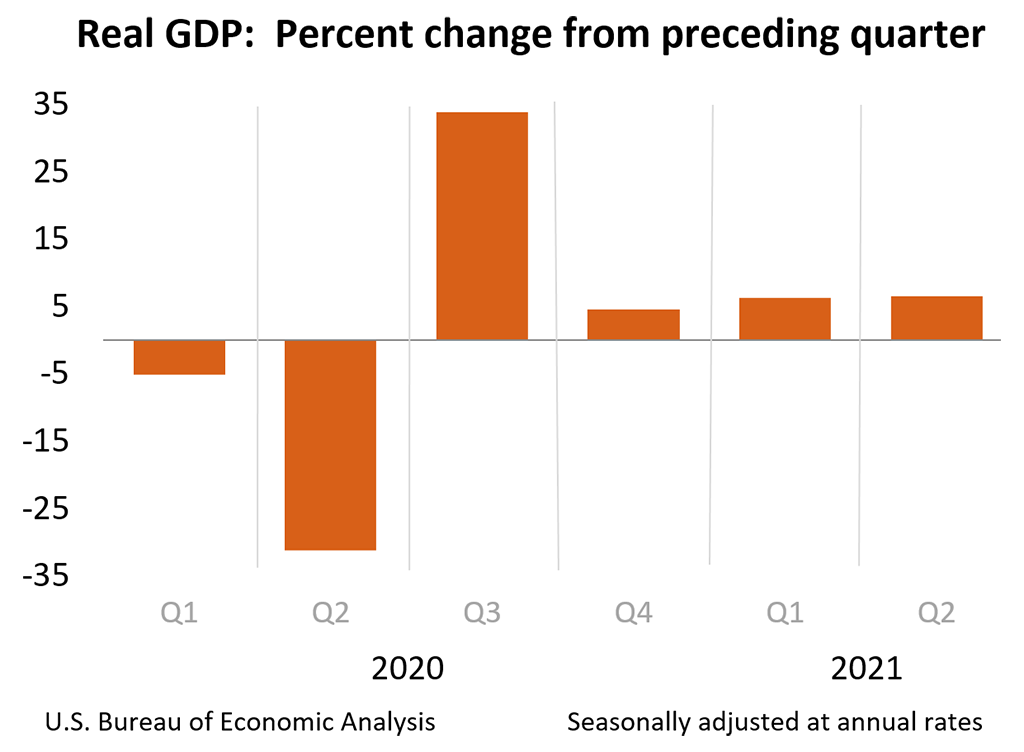The economy is still improving and that is good news for business and job seekers. Increases in GDP should also come with a better understanding of how the post-COVID transforming market may need additional measurements to fully grasp the contributory nature of the digital economy. Understanding Gross Domestic Product (GDP) and Digital Gross Domestic Product DGDP might be helpful in this discussion.
According to the Bureau of Labor Statistics, "
Real gross domestic product (GDP) increased at an annual rate of 6.5 percent in the second quarter of 2021, reflecting the continued economic recovery, reopening of establishments, and continued government response related to the COVID-19 pandemic. In the second quarter, government assistance payments in the form of loans to businesses and grants to state and local governments increased, while social benefits to households, such as the direct economic impact payments, declined. In the first quarter of 2021, real GDP increased 6.3 percent (revised)." (
BEA GDP, July 19th, 2021)
In the report the BEA moves on to discuss in greater detail what is going on, "The increase in real GDP in the second quarter reflected increases in personal consumption expenditures (PCE), nonresidential fixed investment, exports, and state and local government spending that were partly offset by decreases in private inventory investment, residential fixed investment, and federal government spending. Imports, which are a subtraction in the calculation of GDP, increased (table 2). (BEA, Q2-21 GDP July 29th, 2021)
Its important to understand economics from a macro economic viewpoint to see how the larger systems are working and changing the market while our metrics may not accurately reflecting the nature of those changes (One of the reasons why proper digital age measurements can lead to a
Calibrated Tax Model for international commerce.). To do that we start with the basics. Some might wonder what a Real Gross Domestic Product (Real GDP) is? "
Real gross domestic product (Real GDP) is an inflation-adjusted measure that reflects the value of all goods and services produced by an economy in a given year (expressed in base-year prices) and is often referred to as constant-price GDP, inflation-corrected GDP, or constant dollar GDP. (I
nvestopedia, 2021)"
GDP struggles as a measurement in an increasingly digital world. GDP has been criticized as not capturing the full scope of a non-tangible virtual economy (Watanabe, Tou, & Neittaanmaki, 2018). A better metric could mean we uncover significant additional resources at our fingertips that we are not fully calculated national development (Metrics are imperfect and that is why we must rethink them from time to time. Keep in mind the difference between numbers and actual available units of productivity. i.e. fictitious number vs. actual labor power kind of thing.).
According to the Harvard Business Review, "...
GDP captures only the monetary value of all final goods produced in the economy." (
Brynjolfsson & Collis, 2019 para 8). Meaning that it has difficulty with things like ideas and items that don't fit within the current theoretical schools of economic thought (This is where too much elite indoctrination can limit the ability to see across fields of study.)
Digital GDP can be difficult to understand because its definition is often off. For example, some might define digital GDP as free services while others broaden it to include wider aspects of the virtual economy. A 2018 report by the IMF Indicates, "
Digitalization encompasses a wide range of new applications of information
technology in business models and products that are transforming the economy
and social interactions. Digitalization is both an enabler and a disruptor of businesses." (
IMF, 2018, Staff Report).
What you will find is that global tax systems lack standard measurements of the digital economy because the definitions are in flux and there are pre-existing categories many of these digital activities already fall imperfectly into (i.e. leading to miscategorization of some measurements). Something as simple as how we categorize information can make a big difference in what we see and what we focus on in terms of policy development. (You can dig deeper into the data but you can't predict it without new innovative practices. See
Big Data, Manufacturing, Hypothesis Driven Decision)
The digital economy may push us to change the way we conduct business and calculate national performance for decision making purposes. In the next 5 years we may add U.S. based cryptocurrency and further increases in such things as online marketspace and virtual work that leads to the necessity in taking a closer look at more fundamental economic activities (i.e. statistics that help us understand and attract business in the digital economy eras as well as ensuring government understand the full nature of the economy for such things as a calibrated tax system and updated policies.)
Metrics are great but they also have a high probability of being somewhat misleading. We measure what we already understand and sometimes we find new things through calculating this data in new ways. Other times (i.e. digital economy) it is better to think about the possibility of leading the conversation on the digital economy (..especially if we want to lead the world economy in this new era.) in ways that add current international metrics with some new numbers that may better reflect digital capital. Countries are looking for direction on how to measure and calculate the new economic realities they find themselves in. Jumping in as an international leader with the world's biggest economy might create lots of other advantages in international commerce through pro-active guidance (In other words, lets tackle and influence the direction of world commercial thought. There are advantages to being innovative thought leaders as well.).
Real Gross Domestic Product (2021).in Investopedia https://www.investopedia.com/terms/r/realgdp.asp


No comments:
Post a Comment